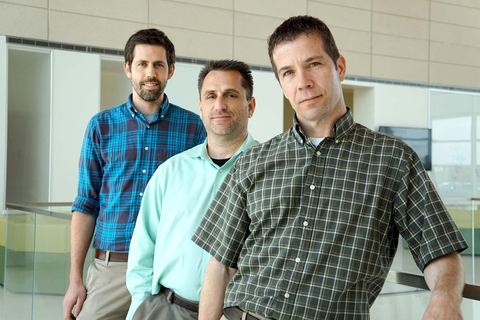The Feinstein Institutes for Medical Research and the journal Bioelectronic Medicine announced that Michael Kilgard, PhD, Robert Rennaker, PhD, and Seth Hays, PhD, distinguished researchers and professors at the University of Texas at Dallas, have been awarded the Anthony Cerami Award in Translational Medicine. This marks the first time the award will go to scientists who have made significant strides in translational bioelectronic medicine research.
This press release features multimedia. View the full release here: https://www.businesswire.com/news/home/20250203962796/en/

Drs. Seth Hays, Robert Rennaker and Michael Kilgard are recipients of the 2024 Cerami Award. (Credit: The University of Texas at Dallas).
Established in 2013, the Cerami Award honors investigators who have produced knowledge through their discoveries and innovations which aids in the treatment and cure of disease. Previous Cerami Awards have been conferred by the editors of Molecular Medicine, an open-access journal published by the Feinstein Institutes, and BMC, part of Springer Nature. This is the first time the award has been bestowed by the editors of Bioelectronic Medicine (also published in collaboration with BMC/Springer Nature). The recipient’s collective monograph, describing their careers insights and research journeys, was published today in the journal.
“The Cerami Award is dedicated to recognizing scientists who have made momentous strides in scientific research and have the ability to translate science from the bench to the bedside,” said Valentin A. Pavlov, PhD, professor in the Institute of Bioelectronic Medicine at the Feinstein Institutes and executive editor of Bioelectronic Medicine. “Drs. Kilgard, Rennaker and Hays adapted vagus nerve stimulation to improve the effectiveness of physical rehabilitation after stroke and continue to lead in exploring the use of these devices to improve the lives of patients.”
More than 10 years ago, Drs. Kilgard, Rennaker and Hays created a therapy using vagus nerve stimulation (VNS) to reconfigure brain circuits. Since then, researchers have been honing this method to address diverse conditions, such as stroke. This work built the foundation for a pivotal clinical trial published in 2021 which revealed that combining VNS with rehabilitation exercises for individuals experiencing arm and hand weakness post-stroke, resulted in enhancements two to three times more significant than those observed in the control group undergoing rehabilitation alone. In August 2021, the Food and Drug Administration (FDA) approved the rehabilitation system for chronic ischemic stroke survivors, making it the first such treatment of its kind.
“Drs. Kilgard, Rennaker and Hays have made outstanding contributions to the field of bioelectronic medicine and vagus nerve stimulation,” said Kevin J. Tracey, MD, president and CEO of the Feinstein Institutes and Karches Family Distinguished Chair in Medical Research, editor-in-chief of Bioelectronic Medicine and Cerami Award committee member. “Their pioneering efforts are inspirational and most deserving of the Cerami Award.”
The award is made possible by the generosity of the Anthony Cerami and Ann Dunne Foundation for World Health, Inc. Dr. Cerami’s breakthrough translational work includes the identification of the potential of anti-TNF antibodies to treat several inflammatory diseases, including rheumatoid arthritis, and the development of the HbA1c Diagnostic Test – the gold standard for the diagnosis and control of diabetes.
Dr. Kilgard is a professor of neuroscience in the School of Behavioral and Brain Sciences at UT Dallas. His focus is on conducting neuroscience research that can be translated into clinical settings to treat people with serious psychiatric or neurological conditions including stroke, tinnitus, post-traumatic stress disorder and spinal cord injury.
“We have dedicated our careers to finding new and innovative ways to help people using technology and devices,” said Dr. Kilgard. “This recognition sparks a commitment to continue to advance this field of medical research.”
Dr. Rennaker, a biomedical engineer and professor of neuroscience at UT Dallas, develops medical devices to interface with the brain and body to improve quality of life. He is co-founder of Xnerve Medical Inc., which is developing therapies to improve life for those who have post-traumatic stress, spinal cord injuries and stroke. He is also the VP of Engineering for Konan Medical USA, which is developing medical devices to objectively measure visual function.
“Discovering new technologies that can improve the quality of life of people with neurological injuries is beyond rewarding,” said Dr. Rennaker. “The Cerami Award is a tremendous honor that clearly demonstrates that team science is making a positive and significant change. I am grateful to be part of this community and this team.”
Dr. Hays is an associate professor of bioengineering at UT Dallas. His work combines neuroscience and biomedical engineering to develop therapies for neurological disorders, primarily using VNS to accelerate brain reorganization. His research continues to delve into identifying the neural mechanisms activated by VNS to enhance neuroplasticity in victims of stroke, spinal cord and nerve damage, as well as post-traumatic stress disorder.
“The recognition from the Cerami Award is a testament to achieving a goal that we began investigating more than a decade ago,” said Dr. Hays. “We look forward to continuing our research, collaborating with other scientists and sharing those advancements worldwide.”
For more information about the Cerami Award, visit: https://feinstein.northwell.edu/about-us/awards.
About the Feinstein Institutes
The Feinstein Institutes for Medical Research is the home of the research institutes of Northwell Health, the largest health care provider and private employer in New York State. Encompassing 50+ research labs, 3,000 clinical research studies and 5,000 researchers and staff, the Feinstein Institutes raises the standard of medical innovation through its six institutes of behavioral science, bioelectronic medicine, cancer, health system science, molecular medicine, and translational research. We are the global scientific leader in bioelectronic medicine – an innovative field of science that has the potential to revolutionize medicine. The Feinstein Institutes publishes two open-access, international peer-reviewed journals Molecular Medicine and Bioelectronic Medicine. Through the Elmezzi Graduate School of Molecular Medicine, we offer an accelerated PhD program. For more information about how we produce knowledge to cure disease, visit http://feinstein.northwell.edu and follow us on LinkedIn.
View source version on businesswire.com: https://www.businesswire.com/news/home/20250203962796/en/
Contacts
Julianne Mosher Allen
516-880-4824
jmosherallen@northwell.edu





